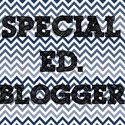Preparing for the Year--Lesson Planning and a Freebie
July 28, 2013
Last year, my building moved to Backwards Planning all units. This takes time. Lots of time. So I decided to get ahead start. Maybe save myself a day or two of planning down the road. If you're not familiar with backwards planning, it comes from Jay McTighe and Grant Wiggins about ten years ago.
I have started by getting Step 1 complete: Desired Results. This is where I get my learning targets and essential questions. The key What should students know, understand, and be able to do? What is the ultimate transfer we seek as a result of this unit? What enduring understandings are desired? What essential questions will be explored in-depth and provide focus to all learning?
Step 2 is Determine Assessment Evidence. This changes unit to unit because I may need for assessment data or I may not. The key here is How will I know if students have achieved the desired results? What will we accept as evidence of student understanding and their ability to use (transfer) their learning in new situations? How will we evaluate student performance in fair and consistent ways?
Step 3 is daily planning. The key being How will I support learners as they come to understand important ideas and processes? How will I prepare them to autonomously transfer their learning? What enabling knowledge and skills will students need to perform effectively and achieve desired results? What activities, sequence, and resources are best suited to accomplish our goals?
The pros to planning this way--I hit all the standards by the end of the unit. I know that students are getting it because of either the progress monitoring or student self-assessment. What I dislike-is this takes time. Time is not something I have tons of in special education. But by spending the time I know that students will have the skills and knowledge to be stronger in class.
Freebie time--this is one unit for intermediate reading with Step 1 completed and a template you can print to complete Steps 2 and 3 based on your students and need. This will be the first unit that I will teach next month. It was planned using backwards planning. Have a great weekend! If you're traveling-safe travels.

I have started by getting Step 1 complete: Desired Results. This is where I get my learning targets and essential questions. The key What should students know, understand, and be able to do? What is the ultimate transfer we seek as a result of this unit? What enduring understandings are desired? What essential questions will be explored in-depth and provide focus to all learning?
Step 2 is Determine Assessment Evidence. This changes unit to unit because I may need for assessment data or I may not. The key here is How will I know if students have achieved the desired results? What will we accept as evidence of student understanding and their ability to use (transfer) their learning in new situations? How will we evaluate student performance in fair and consistent ways?
Step 3 is daily planning. The key being How will I support learners as they come to understand important ideas and processes? How will I prepare them to autonomously transfer their learning? What enabling knowledge and skills will students need to perform effectively and achieve desired results? What activities, sequence, and resources are best suited to accomplish our goals?
The pros to planning this way--I hit all the standards by the end of the unit. I know that students are getting it because of either the progress monitoring or student self-assessment. What I dislike-is this takes time. Time is not something I have tons of in special education. But by spending the time I know that students will have the skills and knowledge to be stronger in class.
Freebie time--this is one unit for intermediate reading with Step 1 completed and a template you can print to complete Steps 2 and 3 based on your students and need. This will be the first unit that I will teach next month. It was planned using backwards planning. Have a great weekend! If you're traveling-safe travels.

Labels:freebie,lesson plan,reading
Subscribe to:
Post Comments
(Atom)

About Me
Welcome to my all thing special education blog. I empower busy elementary special education teachers to use best practice strategies to achieve a data and evidence driven classroom community by sharing easy to use, engaging, unique approaches to small group reading and math. Thanks for Hopping By.
Resource Library
Thank you! You have successfully subscribed to our newsletter.
Search This Blog
Labels
21st Century
Autism
Bloom's Taxonomy
DIBELS
ELL strategies
Formative Assessment
Fountas and Pinnell
Guided Reading
IEP
Just Words
Progress monitoring
RTI
Reading Comprehension
Wilson Reading System
apps
back to school
beginning readers
best practices
books to read
classroom
common core
comprehension
data
differentiation
fluency
freebie
intervention
lesson plan
math
parents
phonics
reading
small group
special education
teaching
technology
vocabulary
writing












0 comments:
Post a Comment